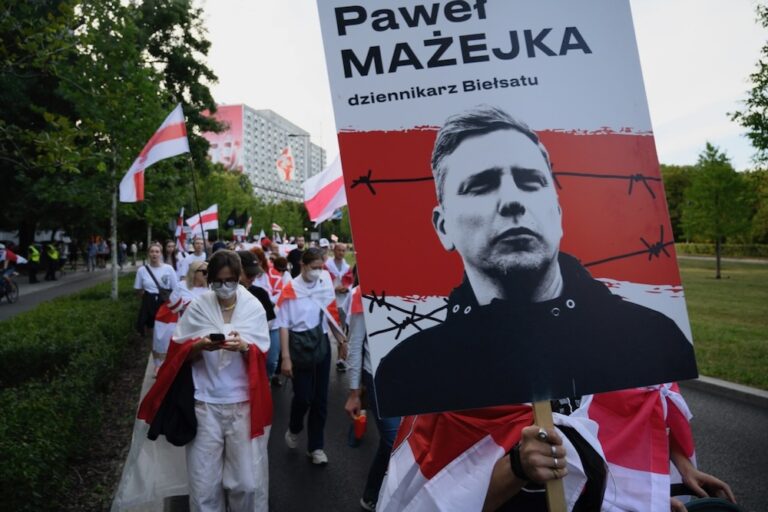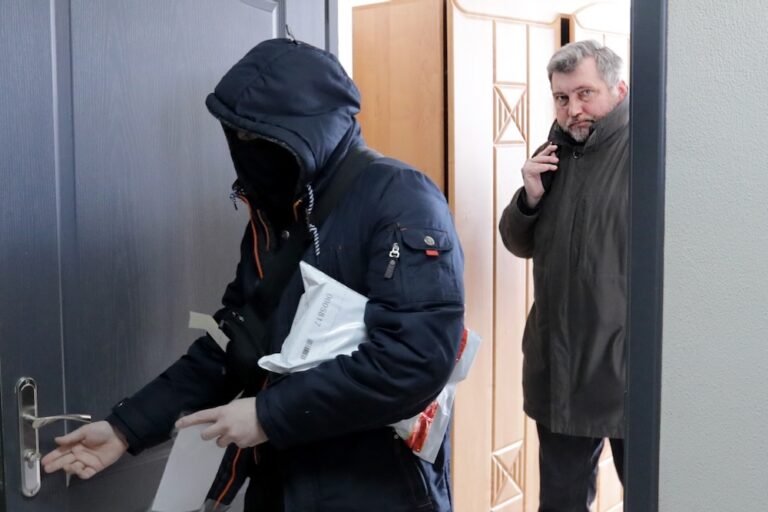(WiPC/IFEX) – A number of journalists are among the up to 100 people arrested during demonstrations in Belarus on 25 March 2008, of whom 26 have since been sentenced to prison terms of between five and 15 days. Many more suffered beatings by police. WiPC has long been concerned by the repression of free expression […]
(WiPC/IFEX) – A number of journalists are among the up to 100 people arrested during demonstrations in Belarus on 25 March 2008, of whom 26 have since been sentenced to prison terms of between five and 15 days. Many more suffered beatings by police. WiPC has long been concerned by the repression of free expression and the harassment and arrests of Belarus journalists. These recent events are further cause for concern. International PEN is calling on the Belarus authorities to end attacks on the media and to release all those detained for the non-violent practice of their right to freedom of expression and association.
On 25 March 2008, thousands gathered in Minsk and elsewhere in Belarus to celebrate the 90th anniversary of the 1918 founding of the short-lived Belarus National Republic (BNR). (The BNR was formed in March 1918 during the German occupation, and lasted until the return of the Red Army in early 1919. During its brief existence, Belarus-language publishing houses, newspapers and schools flourished. The BNR used the red-and-white Belarus flag that became the official flag between 1991 and 1995 until it was replaced by another and became illegal. It has been adopted by some Belarus opposition supporters.)
Trials against over 70 people opened just a day later, on 26 March, where 26 were summarily sentenced to between 5 and 15 days in prison and another 50 were fined. All were accused of staging illegal demonstrations and public affray.
Among the journalists in detention is Sjamen Pechanko, of the newspaper “Nasha Niva”, who was sentenced to 15 days’ imprisonment, and will be held until 9 April. According to European Radio Belarus, he is accused of shouting out phrases such as “Shame!” and “Long Live Belarus”, and waving the now-illegal red-and-white flag of the BNR. Age 27, Pechanko was awarded the independent Belarus Association of Journalist’s 2007 Free Word award for his fictional piece, “Savage and Julia”. He is also the author of “In the Belarus Army”.
Arrested a day before the demonstration, and sentenced to five days in prison, was the artist Alexsei Maraczkin, who was taken from his studio. As the head of the Union of Belarusians Abroad and a key member of the Belarus Popular Front Party, it is thought that his arrest was aimed at preventing him from participating in the following day’s event.
Photographs of Andrei Lankievicz, a “Nasha Niva” photographer, show him bleeding profusely from a head wound as he was led away by police. PEN understands that Lanckievicz has not been sentenced.
On 27 March, police staged a nation-wide search of the homes of independent journalists and of their offices. According to the Belarus Media Association, the police action is being carried out under Article 367 of the Belarus Penal Code that penalises “libel” against the Belarus President. There are fears that this may lead to further arrests. The Belarus state prosecutor’s office told Radio Free Europe/Radio Liberty (RFE/RL) that the searches were being made in relation to a case initiated in 2005 against three people who had posted cartoons ridiculing President Lukashenko on a website that year. The three are said to have fled Belarus in 2007. Police are looking for their “collaborators”. The Belarus Foreign Ministry has also told RFE/RL that searches against European Union (EU) and Polish-funded independent newspapers were being carried out because they had no accreditation, and, furthermore, “had illegally engaged in journalistic activities for foreign money on the territory of the Republic of Belarus for a long time.”
Among those attacked on 25 March were a number of journalists from outside Belarus, mainly Lithuania, Poland and Ukraine. Two Lithuanian TV journalists were badly beaten as they attempted to film the events. The Lithuanian Ministry of Foreign Affairs condemned the events as “a gross violation of the principle of free expression”. The United States embassy has withdrawn staff in protest, and further international sanctions are threatened. The EU, which has been working on improving relations with Belarus, not least because gas lines from Russia to the EU run through the country, on 28 March expressed “deep disappointment” at the violence used against demonstrators and the arrests.


